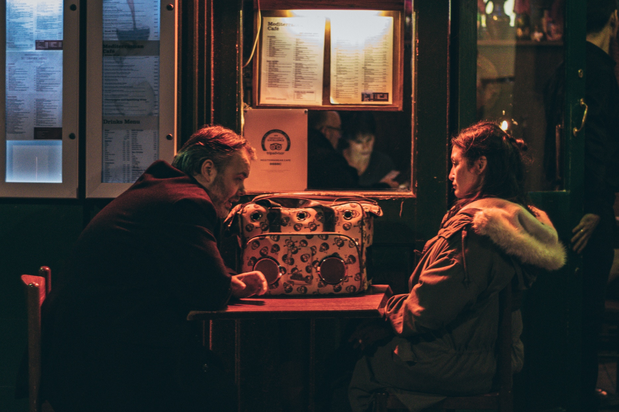As a life coach with three degrees in counseling, psychology and addictions, I thought I knew the obvious signs of alcoholism. I was confident I could spot them a mile away. Certainly, I never dreamed it would be able to disguise itself in a romantic partner.
I’d been in counseling for years and dealt with my habits of codependency, a result of growing up around addiction. In the past, I always sought what was familiar, but now I was aware I was seeking something completely different. At least, that’s what I thought.
Evidently, I still had lessons to learn and growing to do.
I met a man, less than a decade ago, when I was in the midst of a very challenging but exciting transition. I had been involuntarily uprooted from my home and job and moved into a beautiful new space with very few belongings, my two dogs and an air mattress upon which to lay my head. It was the beginning of a new chapter of my life.
I was still seeing my counselor but had begun the termination process, as I was now ready to begin applying all I had learned on my own. I’d been intentionally single for some time while falling in love with myself, and I was ready to open my heart to someone new. I was in a good relationship with me, and I was now open to the idea of one with someone else.
Drew was a successful business owner. He seemingly had many friends and acquaintances. Additionally, he had never received a DWI or citation for public intoxication. In fact, he’d never acquired as much as a speeding ticket.
On paper, he had it way more together than I ever did.
But did he drink? Yes. He did. And I (of course) was sober.
Still, I never saw him intoxicated, nor did I notice any changes in his behavior when he drank. So, I considered him a social drinker, someone who seemingly has the ability to drink responsibly and in moderation.
In other words, I didn’t see any issue. He was a man with a thriving business, no legal issues or obvious social consequences and seemingly not dependent on alcohol. He even stopped drinking for the duration of an illness that required him to take a prescription antibiotic, as instructed by his primary physician.
To me, these were all signs of a responsible, moderate drinker and the exact opposite description of any addict I’d ever known, dated or was related to. With all things considered, I allowed myself to invest time, begin a relationship and fall in love with this man. And, with regard to the latter, that was an easy task. The beginning of this journey was absolute bliss. In fact, I thought him to be my soulmate, and it seems he was; one of many.
Things took a turn about six months into our relationship. A life crisis spiraled him into panic and eventually a state of depression. Prior to this, I had only seen him drinking moderately; a beer or two after work or a glass of wine with dinner. But, as the circumstantial depression set in, he began to increase his daily intake.
Of course, even at this point, I did not see addiction. I merely assumed he was unwittingly entering onto a slippery slope; one that could easily result in chemical dependency, but I’m aware substance abuse does not equate to addiction. As such, I assumed he was simply ignorant to the disease and the sneaky ways in which it can return. So, as a loving and concerned partner, I gently voiced my concerns regarding using alcohol – a known depressant – as a stress-reliever during a time of crisis (or any time).
It was at this point addiction reared its ugly head.
A heightened degree of unwarranted defensiveness ensued. My sobriety was attacked and my motives were distorted. He shouted, “I will never stop drinking. That’s what I do. I know you have issues with alcohol, but I’m fine. I’ll always drink. I’ll have a beer, a glass of wine, whatever I want. That will never change.” I immediately recognized this reaction, and I instantly began to review our relationship, what I knew of him, what I learned from my former counseling sessions and my formal education.
As I recapped the drinks with dinner and daily beers after work, the sporting events that seemingly went hand-in-hand with alcoholic beverages, the inability to deal with life’s upsets without spiraling, victimizing and using the latter as a ploy to drink more, I remembered a very important fact about alcoholism. It doesn’t matter how much or how often you drink but why you drink and what happens when you do. That’s what determines whether or not there is a problem.
Immediately, I began to realize I was in love with what’s known as a functioning alcoholic. In other words, I had indeed sought and found something completely different from what I was familiar with.
My mother – a heroin addict and alcoholic – was in no way functioning. She was on the streets, homeless and destitute, having lost me to my grandparents and all her valuable belongings to pawn shops and theft. She was the classic dysfunctional addict; easy to spot and obvious to even society’s most uninformed individuals.
But this man’s ability to own a successful business and steer clear of the long arm of the law had everyone fooled, including me. Sadly, additionally, including him.
Though the denial of an issue is something he never came out of, I did. It was his lack of emotional intimacy and availability, unwillingness to confront reality, lack of ability to communicate and other basic life skills that not only reiterated the existence of functioning addiction but also killed any romantic love I had.
Only an active codependent could or would have stayed. And, thankfully, I was no longer that.
Still, it was a very important lesson, a needed reminder and a huge step on my journey of personal growth and healing. And, to his credit, he was a valuable teacher; a difficult one, but a teacher nonetheless.
I am grateful to the teacher, for the lessons and the experience that reminded me to not merely seek something different from what I know but something (or someone) holistically healthy.
|
If you or someone you know is seeking help from addiction, please visit our directory of treatment centers or call 800-891-8171 to speak to a treatment specialist. |
*Editor's note: The names, details, and circumstances may have been changed to protect the privacy of those mentioned in this publication.








